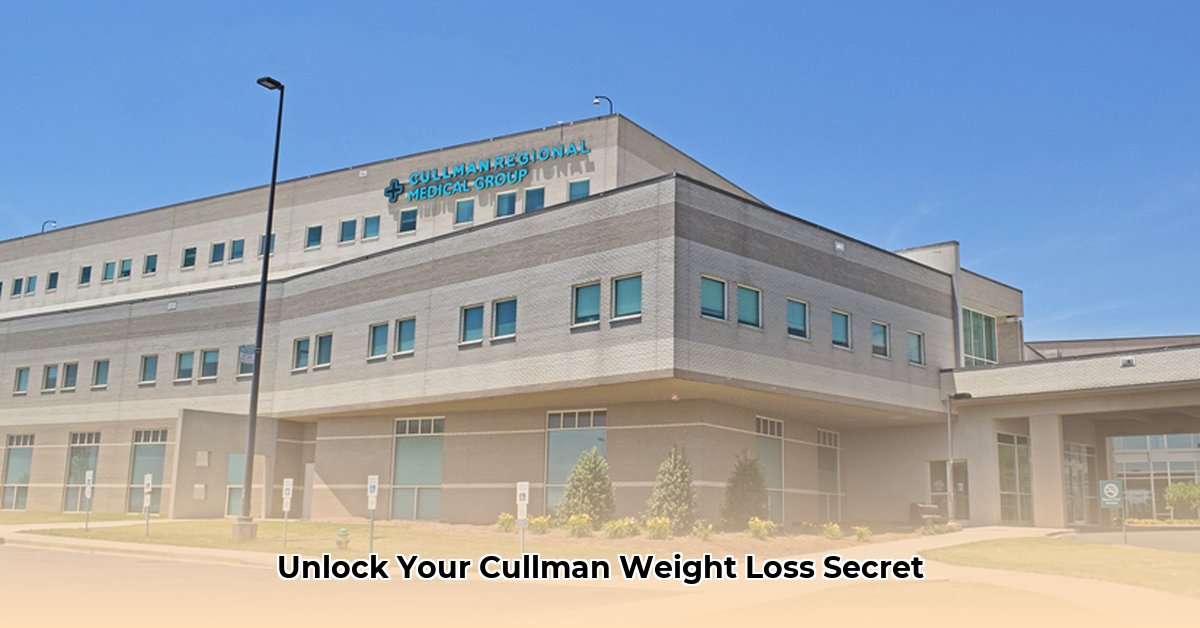
Losing weight can be a challenging journey, often filled with setbacks and self-doubt. But in Cullman, Alabama, effective resources exist to help you achieve your goals. This guide compares two primary weight loss approaches—non-surgical programs and bariatric surgery—available in Cullman, offering actionable advice to help you make the best choice for your individual needs.
Understanding Your Weight Loss Options: Non-Surgical vs. Surgical
Before embarking on your weight loss journey, understanding the fundamental differences between non-surgical and surgical approaches is crucial. Non-surgical methods typically focus on lifestyle changes, while surgery offers a more drastic, immediate intervention. Neither approach is inherently "better"—the optimal choice depends entirely on your health, lifestyle, and personal preferences.
Cullman Weight Loss Center: A Non-Surgical Approach
The Cullman Weight Loss Center emphasizes sustainable lifestyle modifications, promoting long-term health rather than quick fixes. Their holistic approach typically involves a combination of nutritional guidance, personalized exercise plans, and behavioral counseling. This comprehensive strategy aims to address the underlying causes of weight gain, encouraging lasting habits rather than temporary solutions. They may also incorporate medically supervised supplements or injections as part of a customized program.
What they offer: The Center provides a supportive environment, guiding you through nutrition education, creating tailored fitness regimes, and providing access to ongoing support groups. The focus is on fostering self-efficacy and building long-term healthy habits.
How it works: The process starts with a comprehensive consultation to define your goals and assess your current health. Based on this assessment, a personalized plan is developed. Regular check-ins with the team allow for continuous support, adjustments to your plan as needed, and provide accountability.
Is this option right for you?: This non-surgical approach is ideal if you prefer a gradual, guided path prioritizing sustainable lifestyle changes and consistent support. It's a better fit for individuals seeking a holistic approach, focusing on building long-term habits rather than rapid weight loss.
Cullman Regional Bariatric Center: The Surgical Route
For individuals with a high Body Mass Index (BMI) (a measure of body fat based on height and weight) and significant health problems related to obesity (such as type 2 diabetes or sleep apnea), bariatric surgery may be a suitable option. The Cullman Regional Bariatric Center offers various minimally invasive surgical procedures designed to promote significant weight loss. This is a major commitment, demanding rigorous preparation and a dedicated recovery period.
Surgical Procedures Available: The Center likely offers several procedures, including gastric bypass and sleeve gastrectomy, often performed using advanced techniques like robotic surgery. The specific procedure recommended will depend on individual factors and a comprehensive assessment.
The Surgical Process: The process begins with a thorough evaluation to determine your suitability for surgery. This includes medical tests and consultations with the surgical team to assess your overall health and discuss potential risks and benefits. Post-surgery, intensive aftercare is crucial for successful recovery and adjustment to your new lifestyle.
Should you consider surgery?: Bariatric surgery should be considered if you have a high BMI and significant health risks associated with obesity, and you're prepared for a major commitment involving both the surgical procedure and long-term lifestyle changes. It is crucial to understand the potential complications and risks associated with any surgical intervention.
Comparing Your Options: A Head-to-Head Analysis
This table summarizes the key differences between the two approaches:
| Feature | Cullman Weight Loss Center (Non-Surgical) | Cullman Regional Bariatric Center (Surgical) |
|---|---|---|
| Cost | Generally lower upfront cost; ongoing costs vary according to program. | Significantly higher upfront cost; ongoing costs for follow-up care. |
| Time Commitment | Gradual, requiring consistent effort over an extended period. | Intensive initial phase followed by ongoing lifestyle adjustments and monitoring. |
| Risk Level | Low; risks are primarily those associated with potential medication side effects. | Higher; includes surgical risks, complications, and the need for long-term monitoring |
| Eligibility | More inclusive; broader range of BMIs and health conditions. | Typically requires higher BMIs and weight-related health concerns. |
| Long-term Maintenance | Requires consistent lifestyle changes and ongoing commitment. | Demands lifelong dietary and lifestyle modifications and adherence to medical check-ups. |
Choosing the Right Approach: A Step-by-Step Guide
Making the right decision requires careful consideration. Follow these steps:
Comprehensive Medical Evaluation: Start with a visit to your primary care physician for a complete health assessment, including a BMI calculation and relevant blood work. Discuss your weight loss goals and your willingness to commit to the necessary lifestyle changes.
Consult Both Centers: Schedule consultations with both the Cullman Weight Loss Center and the Cullman Regional Bariatric Center. Ask specific questions about their programs, costs, success rates (if available), and the types of support they offer.
Compare Treatment Plans: Carefully review the details of each program, including long-term commitment, potential risks, support services, and financial implications.
Make an Informed Decision: Choose the option that best aligns with your health, lifestyle, resources, and personal preferences. Choosing the right approach should feel comfortable and empowering.
Commit to Long-Term Change: Remember, sustainable weight loss is a journey, not a race. Regardless of your chosen path, ongoing commitment to lifestyle modifications is essential.
Additional Considerations: Insurance and Support
Insurance Coverage: Contact your insurance provider to determine coverage for both surgical and non-surgical weight loss options.
Support Systems: Weight loss is easier with support. Utilize family, friends, or consider local support groups for encouragement and accountability.
Lifestyle Changes: Long-term success depends on sustainable dietary and lifestyle adjustments. Set realistic goals and focus on habits you can maintain long-term.
Your weight loss journey is personal. By researching your options and seeking professional guidance, you can make an informed decision, setting yourself up for success and a healthier future. The most important step is the first one. Take it.